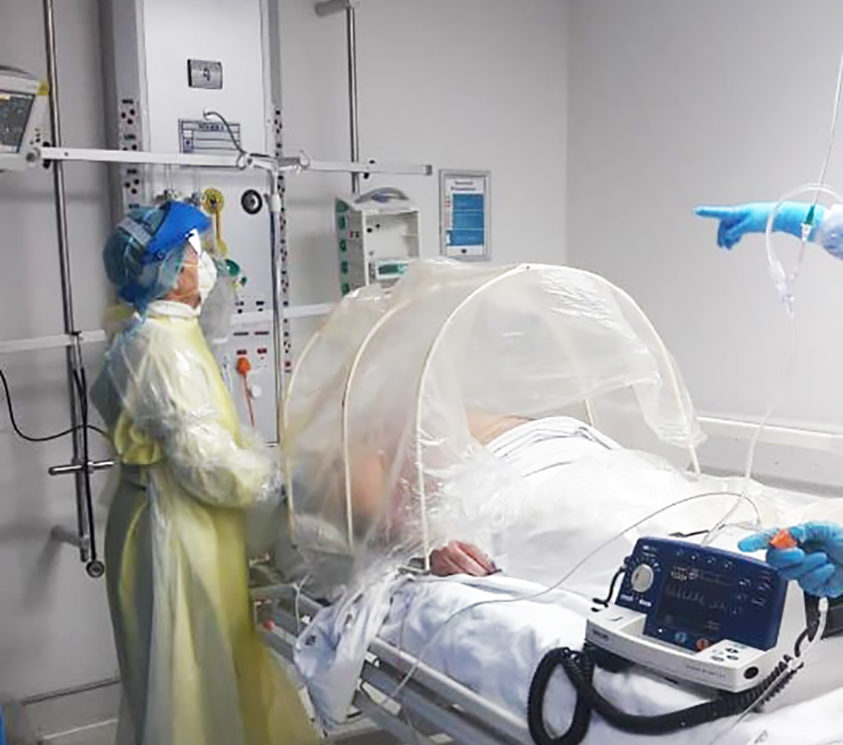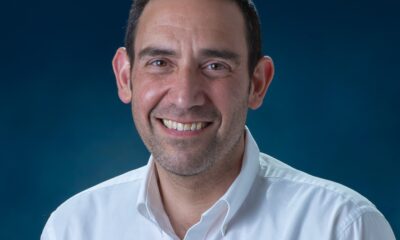
Featured Item

Doctors pull back the curtain on COVID trauma
Published
3 years agoon
Watching a quarter of their patients die from COVID-19. Being yelled at by a family unable to come to terms with their father’s demise. Spending hours talking to families and rabbis when a patient refused ventilation. Seeing the first critically ill young patient typing a goodbye message to his wife, afraid to close his eyes in case he stopped breathing. Witnessing a 17-year-old flinging herself on her father’s body, begging him to keep fighting (when family were allowed into wards).
These are just some of the traumatic experiences that Drs Carron Zinman and Anton Meyberg describe as they try to capture why being on the frontlines of the COVID-19 war has been so devastating to the mental health of doctors and other frontline workers.
They are both pulmonologists at the Linksfield Clinic in Johannesburg, working together during the pandemic. “The most poignant time was when I watched Anton say the vidui prayer for our patients who we knew weren’t going to survive,” says Zinman.
Going back to the beginning, she recalls how they “understood coronaviruses, but SARS-CoV-2 changed the rules. While we were grappling with the complexities of this new disease, we had to contend with a deluge of patients”, many of whom were seriously ill.
“I remember the terror when the first AIDS patient was admitted. I looked after the nursing sister who picked up Ebola, dressing in a spacesuit to assess her. In those times, I felt calm and in control. But COVID-19 was overwhelming and exhausting, and caused a high level of anxiety and stress,” she says.
She remembers getting used to PPE (personal protective equipment), which is uncomfortable, restrictive, and depersonalising.
“We felt like we were fighting a war whose rules of engagement we didn’t understand. I remember the shock at the sheer number of death certificates we had to sign. I recall when Anton admitted a friend – it’s impossible to stay dispassionate in that situation.”
She was deeply affected by the rollercoaster of emotions when patients were well enough to be discharged, yet died suddenly, or the guilt of children who had inadvertently given their parent/s COVID-19.
“More often than not, only one of a couple would go home. The ward rounds felt interminable, often being interrupted by calls for resuscitation and admission. It’s an unpredictable disease and as such, we couldn’t always prepare the families for what was to come. We felt like we were being pulled in multiple directions while being physically tired, sleep deprived, and emotionally drained,” says Zinman.
“Then the second wave hit. We had become complacent, believing we understood this disease, but COVID-19 decided otherwise. The new variant affected younger patients, led to a fuller intensive-care unit and a higher percentage of patients on ventilators. This time, patients tried to get us to promise that they would survive to see their children grow up, and we witnessed last phone calls to wives in which they professed their love and asked them to look after their babies. A lot of time is spent agonising over our decisions, trying to find something more we could do. The emotional trauma inflicted by COVID-19 is unique.”
A local general practitioner (GP), who spoke on condition of anonymity, says, “Since the beginning of the pandemic, I have experienced anxiety, although over time, what specifically triggers it has changed.
“In the beginning, I felt overwhelmed by not knowing enough. We saw the hospitals in Italy, and it was frightening. The thought of possibly having to work in a hospital setting after a number of years as an office-based practitioner was overwhelming. The ‘silver lining’ was the realisation that I wasn’t alone in feeling majorly under-prepared.
“The fear of becoming ill, of bringing the illness home to my family, coupled with the enormous pressure of trying to be available to see patients while having kids at home remote-learning was exhausting,” she continues. “By the time the second wave came, I felt more knowledgeable, but when it came, it was much harder.
“The number of patients who contracted the virus was high. The practice couldn’t keep up with the appointments, tests, and patients who needed to be managed at home. The constant feeling of not being on top of things and also of ‘neglecting’ non-COVID-19 patients took a toll.
“There was the stress of trying to find hospital beds for patients. Everyone was under immense pressure, which was palpable. Trying to support families, keep them updated on their relatives, as well as dispel myths and give reliable advice all felt like a lot to manage.
“And then there were the deaths. So many deaths. It really took a toll on me. I had physical symptoms of anxiety such as a tight chest, abdominal cramps, insomnia, and headaches. I absorb a lot. Usually I try to make time to decompress, but during the peak, it was really impossible. The thought of a third wave gives me massive anxiety. I’m choosing not to think about it.”
Clinical psychologist Dr Hanan Bushkin says that among the medical professionals he has treated, “the rate of burnout, post-traumatic-stress disorder (PTSD), depression, and anxiety is through the roof. With the pandemic showing no end in sight, it has become way more difficult. The brain likes to predict the end point and if it can’t, despondency and depression set in.
“Doctors used to have time to be with family, rest, see friends, exercise, and so on but now they don’t,” he says. “This pandemic has piled on their stressors and eradicated their resources. It’s like being a soldier who has only trained for war but is now experiencing real war, and it’s a whole different ball game. They are seeing traumas that the public don’t see, and this can lead to huge frustration at the ignorance, arrogance, and lack of prevention they see on the street.”
Bushkin says GPs often treat generations of families and get to know them well. Now, he says, “they have a front-row seat to families being broken and the incredible losses of many people that they had a personal relationship with”. In addition, before the pandemic, people who died were usually elderly, or slowly declined after a cancer diagnosis. Now, patients of all ages are getting sick and dying within weeks. “It’s incredibly traumatic,” he says.
“PTSD doesn’t get you when you’re in it,” says Bushkin. “It’s afterwards when the trauma hits, when someone tells themself, ‘I cannot believe that’s the world I’ve just come from’.” He hopes that when the pandemic is over there will be some kind of platform or forum that allows healthcare workers to “de-brief” what they’ve witnessed.
Clinical psychologist Dr Dorianne Weil, who has consulted healthcare workers since the beginning of the pandemic, says, “Doctors are looked to for answers. But if they don’t have all the answers, it creates a dissonance that’s incredibly stressful. They may feel like an ‘imposter’, like they are ‘living a lie’. Everyone sees them as heroes, but they don’t feel that way.”
“There is also the pervasive fear of contracting the virus and passing it onto their families. They become ‘torn’ as they know it’s their calling. Sometimes they don’t want to rely on their families as a support system as there is a feeling that ‘unless you’re in my shoes, you don’t know what it’s like’,” she says.
Doctors have also had to take on the role of being their patients’ families, when family members haven’t been allowed to comfort dying loved ones. “They are stepping into a role that they aren’t usually called to do. It’s unprecedented, and it’s really getting to them.”
So what can we do to support our frontline workers? “There needs to be a group effort to do what these professionals are recommending,” says Bushkin. “I cannot think of a greater insult than for them to come out of a ward and witness people disobeying the rules. It’s incredibly disheartening, and doctors are devastated. It’s the least we can do.”










